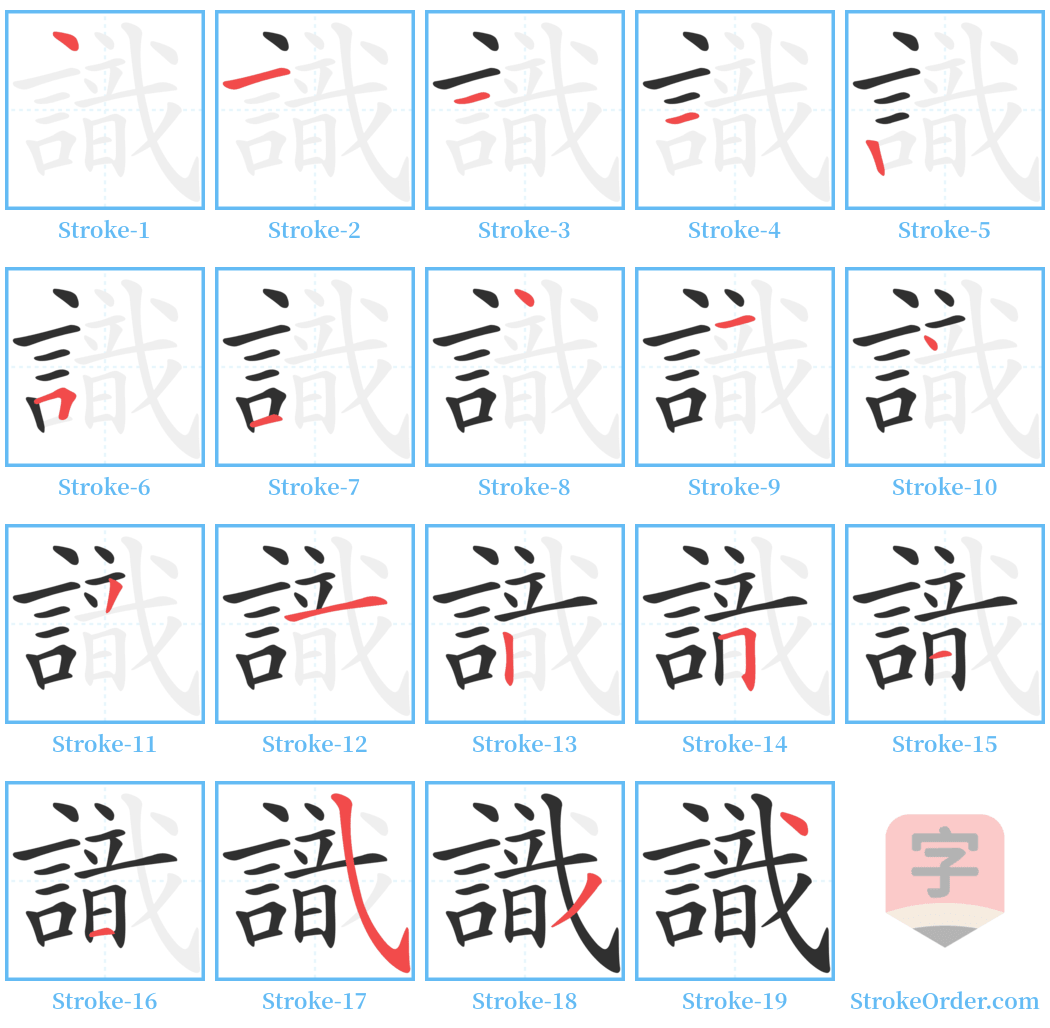識 Stroke Order
Animated Stroke Order of 識

Stroke Order Diagrams for 識

Step-by-Step Handwriting Guide for 識

Learn to Write Chinese Characters with Video Tutorials
Watch the video of writing the Chinese character "識", learn the correct stroke order (笔顺) of the character "識", and master the standard way of writing the character "識".
Free Printable Handwriting Practice with Stroke Order: 識
Printable Writing Practice Worksheet of "識" in Portrait Orientation (Tian Zi Ge)

Printable Writing Practice Worksheet of "識" in Landscape Orientation (Tian Zi Ge)

Information of 識
Pinyin
shí、 zhì
Radical
言
Strokes
19 strokes
Usage
★★★
Definition
to know / knowledge, to record / write a footnote
識:
1. To know; to understand.
知道;瞭解。
2. To recognize; to identify.
認識;識別。
3. To appreciate.
賞識。
4. Knowledge; insight.
知識;見解。
5. Thought and consciousness.
思想意識。
6. Perception.
知覺。
7. Acquaintance; close friend.
相識的朋友;知交。
8. Same as "適". Just now.
通“適”。剛才。
Noun: Insight and experience. Examples: "見識" (experience), "遠識" (broad knowledge), "才識" (talent and knowledge), "膽識" (courage and insight).
名词 见解、见闻。 【组词】:「见识」、「远识」、「才识」、「胆识」。
Noun: The principles of things. Examples: "知識" (knowledge), "常識" (common sense).
名词 事物的道理。 【组词】:「知识」、「常识」。
Noun: Insight and experience. Examples: "見識" (experience), "遠識" (broad knowledge), "才識" (talent and knowledge), "膽識" (courage and insight).
名词 见解、见闻。 【组词】:「见识」、「远识」、「才识」、「胆识」。
Noun: The principles of things. Examples: "知識" (knowledge), "常識" (common sense).
名词 事物的道理。 【组词】:「知识」、「常识」。
Cognition; understanding. Examples: .
认知、了解。 【组词】。
Insight and experience. Examples: .
见解、见闻。 【组词】。
Intimate friend; close acquaintance. Examples: .
知己、朋友。 【组词】。
Cognition; understanding. Examples: "賞識" (appreciation), "素不相識" (strangers), "不識時務" (lack of perception).
认知、了解。 【组词】:赏识、素不相识、不识时务。
Insight and experience. Examples: "高識" (broad knowledge), "學識" (scholarship), "遠識" (wide knowledge).
见解、见闻。 【组词】:高识、学识、远识。
Intimate friend; close acquaintance. Examples: "舊識" (old acquaintance), "親識" (close friend).
知己、朋友。 【组词】:旧识、亲识。
Verb: To memorize; to remember. Same as "志". Example from "The Analects": "默而識之." ("To silently remember it.")
动词 记忆、记住。通「志」。《论语.述而》:「默而识之。」
Noun: Mark; sign. Same as "帜". Example from "Book of Han": "讫无文号旌旗表识,咸怪异之." ("There were no written signs or flags, causing suspicion and strangeness.")
名词 标记、记号。通「帜」。《汉书.卷九九.王莽传下》:「讫无文号旌旗表识,咸怪异之。」
Verb: To memorize; to remember. Same as "志". Example from "The Analects": "默而識之." ("To silently remember it.")
动词 记忆、记住。通「志」。《论语.述而》:「默而识之。」
Noun: Mark; sign. Same as "帜". Example from "Book of Han": "讫无文号旌旗表识,咸怪异之." ("There were no written signs or flags, causing suspicion and strangeness.")
名词 标记、记号。通「帜」。《汉书.卷九九.王莽传下》:「讫无文号旌旗表识,咸怪异之。」